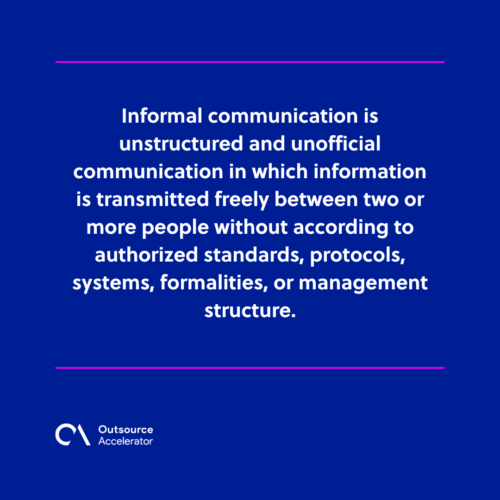Informal Communication
Definition
What is informal communication?
Informal communication is unstructured and unofficial communication in which information is transmitted freely between two or more people according to authorized standards, protocols, systems, formalities, or management structure.
Any type of communication at work that does not occur through the company’s formal techniques or structures is also referred to as informal communication. It can be expressed verbally, in writing, or even through gestures and body language.
Informal communication is defined by an indefinite route of communication, which indicates that information does not flow in a definite chain of command. As a result, data can come from anywhere.
Such communication frequently originates from the social bonds that individuals form with others based on shared interests, preferences, or dislikes.

Workplace informal communication
Informal commercial communication might occur between the CEO and an hourly worker. This form of communication is crucial in the workplace because it can boost employee morale and foster a sense of belonging for both employees and clients.
Informal communication is a casual conversation among coworkers at work. It is unofficial in nature and is based on the informal social ties that develop in the workplace outside of the conventional business hierarchy.
Informal communication may also be known as ‘the grapevine.’ It is when coworkers talk informally about what’s happening in the company or gossip about it.
The grapevine satisfies people’s social requirements and smooths out official relationships by filling in the gaps. It can even bring people together who aren’t in the same chain of command.

Four types of informal communication
There are four different forms of informal communication networks, each of which demonstrates how communication is facilitated. These are the following:
Single strand chain
A single-strand chain is when an individual converses with another, who talks with still another.
For example, one person may provide information to another, who will then pass it on to the next person, and so on. A third person may likewise pass on the same message to the next person in the network, and so on. This type of chain is less dependable and accurate when it comes to transmitting information.
Gossip chain
It is the most widely used form of informal communication. It is an informal group discussion in which everyone discusses a topic.
There is an individual in the gossip chain network who directly communicates the information to all other organization members. A person is usually the central figure who seeks out and distributes information to everyone.
Everyone in the network communicates with one another on a casual basis. When the topic matter is irrelevant to the nature of the employment, this network is frequently used.
Probability chain
When a message is passed randomly amongst different people in an organization, it is a probability chain.
Information is passed from person to person at random in this communication pattern. For example, a person acting as a message source chooses anyone at random from his network to deliver the message. That second person will choose another person at random and send the message to him, and the communication will continue to flow to different people picked at random.
Each member of the network has a distinct source of information. When the data is entertaining but not significant, this communication technique is used.
Cluster chain
One person offers information on a particular issue to a small group of people. These people go on to discuss the subject with a smaller group of others.
An individual works as a message source in a cluster chain network, transmitting information to a pre-selected group of individuals. A few individuals repeat the process with another group of individuals. The chain continues in the same way, and the information reaches everyone in the network.
This pattern is akin to a telephone tree, in which one person calls two other people, these two people call three more people, and these three people are supposed to call three more people.
Similarly, the information is sent to everyone who is linked to the telephone system.
Benefits of informal communication
Informal communication is beneficial to businesses because employees who have friends with whom they can talk enjoy their jobs more, leading to increased productivity. But aside from building work relationships, informal communication has more benefits to your company.
- Flexibility. Because it is free of all forms of formalities, informal communication is more flexible than formal communication.
- Increased productivity. Informal communication can boost productivity across an organization by allowing work-related concerns to be addressed and resolved quickly.
- Workplace partnerships that are healthy. Because communication is purely informal, it can aid in the development of good relationships and friendships among coworkers, resulting in better and more collaborative work.
- Fast communication. Informal conversation travels quickly. Information is easily spread within the company.
- Providing suggestions. Employees advise their superiors about their requests, problems, and how to improve the work implementation system in this system. As a result, it opens up the possibility of sending the suggestion to their administration.







 Independent
Independent




